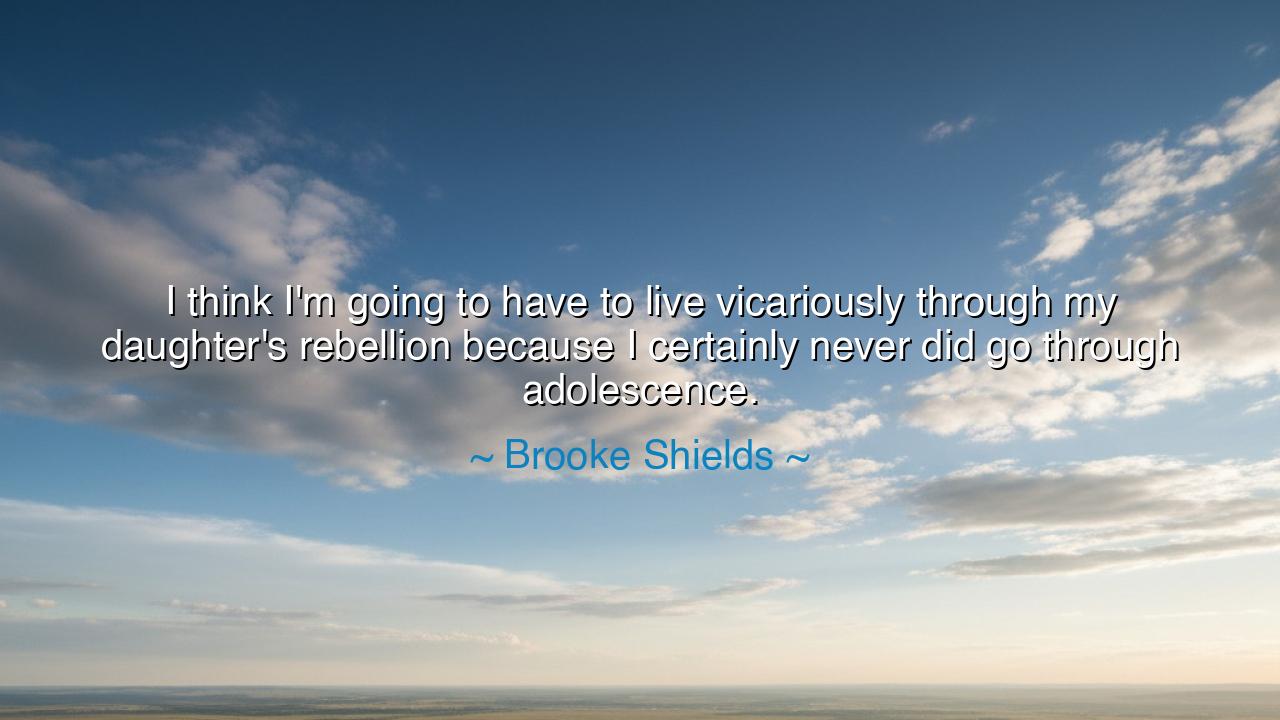
I think I'm going to have to live vicariously through my
I think I'm going to have to live vicariously through my daughter's rebellion because I certainly never did go through adolescence.






Brooke Shields, who grew from child star into a woman shaped beneath the relentless light of fame, once spoke with honesty and reflection: “I think I’m going to have to live vicariously through my daughter’s rebellion because I certainly never did go through adolescence.” Her words, at once tender and ironic, reveal the truth of a childhood lived without the ordinary chaos of youth. Where most discover themselves through mistakes, defiance, and growing pains, Shields was denied such freedom by the demands of a public life. Thus, she finds herself awaiting in her child the storm she herself never knew, seeing in her daughter’s future a mirror and a second chance.
The essence of this saying lies in the paradox of rebellion. For rebellion, though feared by many parents, is not merely disorder or disobedience—it is the fire through which independence is forged. Shields acknowledges that her own path lacked this trial. Her adolescence was bound by discipline, expectation, and scrutiny, leaving little space for mischief or defiance. To her, the rebellion of her daughter will not be a threat, but a reminder of what she missed, a drama of freedom played out on the stage of family life.
History offers many parallels. Consider the Victorian daughters, raised under strict codes of propriety, forbidden to voice themselves in public or to step beyond the narrow path of obedience. Many such young women broke free in small or great ways—through secret letters, through artistic pursuits, through acts of defiance. Their rebellion, though troubling to parents at the time, became the seed of women’s emancipation. Shields’s recognition is similar: she knows that rebellion, though unsettling, is essential to growth, and she is prepared to witness it not with fear but with respect.
Her words also speak of the vicarious journey of parents. For in raising children, parents often relive what they have lost or what they never had. A father who never traveled delights in his son’s voyages. A mother who never danced smiles at her daughter’s stage performance. Shields admits this openly: that her daughter’s adolescence will be, for her, both a lesson and a gift. In the rebellion of her child, she will witness not only defiance, but the courage of becoming one’s own person—something she herself was denied.
There is humility in this confession. Many parents view rebellion as a failure of control, but Shields embraces it as a necessary rite. She does not yearn to silence her daughter’s independence; instead, she accepts it with gratitude, as though saying: “Live not only for yourself, but for me, who could not.” In this, she teaches a deeper truth: that the role of the parent is not to suppress growth, but to guide it, even when it comes in the form of resistance.
The lesson for future generations is clear: do not fear the storms of adolescence. Rebellion, when tempered with love and respect, is not destruction but transformation. Children must test boundaries to find their own path, and parents must be strong enough to let them. If you yourself were denied freedom, then see in your child’s independence not a threat but a blessing. And if you were free, then remember that each generation’s journey is its own, and cannot be lived in another’s shadow.
Therefore, let Brooke Shields’s words be remembered as wisdom: that even in rebellion, there is beauty; even in defiance, there is growth. The parent who accepts this truth will not see adolescence as a season of loss, but as a passage toward strength. And perhaps, like Shields, they will find in their children’s rebellion not only challenge, but redemption—a chance to live again through the flame of youth, and to rejoice in the freedom of the next generation.






AAdministratorAdministrator
Welcome, honored guests. Please leave a comment, we will respond soon